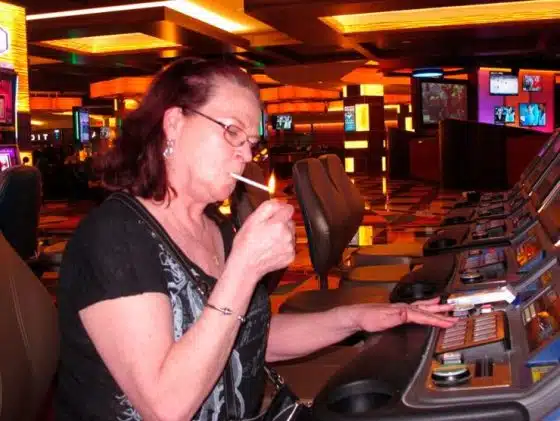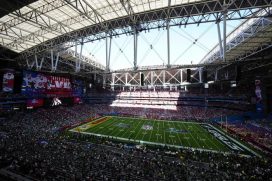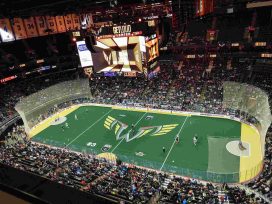Patrick Causey, on Twitter @InsdeTheHuddle
Like many of you, I will never forget where I was the moment I learned about the terrorists attacks on September 1, 2001. I was a junior in high school struggling my way through another computer technology class when I decided to go to the bathroom just to get away. As I was walking down the hall I remember seeing a classmate of mine in AP Biology looking at the t.v. like he saw a ghost. I peaked my head in and saw the images of billowing smoke from the World Trade Center after the first plane hit.
I quickly walked back to my class to tell them what I saw. There was a stunned silence followed by looks of disbelief as though I was playing some kind of sick joke on them. Then, the announcement came on the loud speaker confirming what I had just relayed.
We went down to AP English, where the Vice Principle turned on the news and we saw the second plane crash into the World Trade Center. Any thought of this being a horrible accident quickly dissipated.
Our lives would never be the same.
We follow sports with a passion, sometimes borderline unhealthy, because it's an outlet. A way to escape from the mundane drudgery of our daily lives which, as much of a blessing as they can be, sometimes need an escape valve. Sports provides the vehicle for us to let go, to get away, to share a common bond with our friends over something that, in the grand scheme of things, is largely meaningless.
But 14 years ago, sports played an integral role in helping our nation heel.
On October 30, 2001, just 49 days after the most horrific attack on American soil since Pearl Harbor, President George W. Bush was in the bowels of Yankee stadium preparing to throw the opening pitch of Game 3 of the World Series, the first game played in Yankee Stadium.
He called it the "most nervous" moment of his Presidency. And as if to perfectly underscore the tension in the air, President Bush was throwing warm up pitches while wearing a bullet proof vest, surrounded by secret service man even more so than normal.
In an effort to alleviate the tension, Yankees legend Derek Jeter spoke briefly to the President and warned him that he better not bounce the pitch, or Yankees fans would boo.
But every one in that batting cage knew the importance of the moment. This wasn't just any first pitch. It carried with it significant weight, as it provided Bush the opportunity to send a symbolic message to this country and the world that America was still standing and united more than ever.
Up above, the stadium was guarded like a military base. Lines of fans waited to be searched and patted down by police officers wearing military gear and holding AK-47s, while bomb squads canvased the arena looking for possible threats.
This was the new America, brought about by a despicable attack that shook the very foundation of our country and put on full display the horror that can result from pure evil.
But then, President Bush stepped up to the mound and delivered the perfect strike:
The raw emotion from the crowd in this clip serves as a harrowing reminder of just how much this day changed everything.
The USA chants in the last seconds were a defiant message to the terrorists that our way of life would not be defeated.
As Billy Crystal said in an interview with ABCNews.com: “This is a moment. Your politics go away. Here’s the president of the United States, handed this awful baton to run with and he stood up and basically said f— you.”
Across the country, we tried to return to normal. And in that endeavor, we turned to sports. It was the one constant we had at a time when it seemed everything else was changing.
The NFL suspended all games after 9/11. And while few remember the first game back — the Washington Redskins verses the Green Bay Packers — few will forget the memorable tribute that U2 paid to the victims of 9/11 during the halftime of the Super Bowl in 2002:
In a surreal moment, each of the 2,977 victims names were displayed on a giant screen as U2 performed "Where The Streets Have No Name." People to this day still consider it the greatest halftime show in the history of the Super Bowl, perfectly encapsulating the moment by paying tribute to those lost on that fateful day.
Back in Philadelphia, legendary broadcaster Harry Kalas greeted fans from "the cradle of liberty" in a way that only the great Kalas could do:
With each passing day, the pain brought about by this tragedy hurt a little less. Sports facilitated that healing process.
It was a chance, amidst all the chaos and the war and the uncertainty for one thing: normalcy. As President Bush said, sports has "a palliative effect on the national soul." A means through which we could pretend, even just for a few hours, that everything was the same and everything would be okay.
ESPN just released a "30 for 30" titled "First Pitch" which documented the historic moment of President Bush's first pitch during the World Series at Yankees stadium. You can see it below.
In the grand scheme of things, sports rarely matter.
But in the post-9/11 haze, sports were one of the few things on which we could rely. For that, we should be thankful. For that, we should love sports. And for the 2,977 victims we lost on 9/22, we should #NeverForget.







